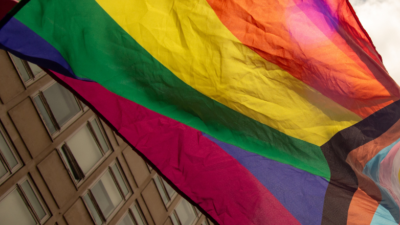New research shows almost 40% of LGBTQ+ employees still hide their identity at work

As LGBTQ+ History Month begins, our new research has highlighted the extent of workplace discrimination faced by LGBTQ+ people in the UK.
The statistics come as the new US administration has rolled back federal commitments to DEI programmes, and threatened future action on private companies.
The research shows that:
- Two in five (39 per cent) LGBTQ+ employees still feel the need to hide the fact they are LGBTQ+ at work
- Over a third of employees (36 per cent) have heard discriminatory comments made about an LGBTQ+ colleague
- More than 1 in 4 LGBTQ+ people (26 per cent) experienced negative comments or conduct from customers or clients because of their identity
- 12 per cent of LGBTQ+ employees believed they were fired or dismissed because they are LGBTQ+
- Nearly a third of LGBTQ+ employees (31 per cent) did not agree they could be themselves at work. Of these, 53% have experienced discrimination, such as receiving verbal or physical abuse, or feeling excluded
- Three in ten LGBTQ+ employees (31%) wouldn’t feel comfortable reporting discrimination if they experienced homophobic or biphobic bullying or harassment.
This new research shines a light on the high levels of discrimination and fear that LGBTQ+ employees still face, with 2 in 5 (39 per cent) of LGBTQ+ employees still feeling they need to hide the fact they are LGBTQ+ at work. More than 1 in 4 LGBTQ+ people (26 per cent) experienced verbally abusive conduct from customers or clients because of their identity.
With many organisations rolling back on their commitments to diversity, equity and inclusion, these statistics are a stark reminder of why inclusion matters more than ever, and that it cannot be dismissed if businesses want to champion and retain the best talent.
This new data comes as LGBTQ+ History Month starts in February, and as new figures from the UK Office for National Statistics (ONS) show that more than one in ten 16 to 24 year olds in the UK now identify as lesbian, gay or bisexual. These young people will be a crucial part of our workplaces, politics and lives in the future, so organisations must stand firm and commit to equality and inclusion for our future workforce.
This is a powerful reminder that, in 2025, workplaces are still failing their LGBTQ+ employees; and that more policies and practices are needed to enhance inclusion in the workplace, not less.
Stonewall urges businesses not to bow to political pressure and have their heads turned. The value of inclusive and empowering company cultures is well established and the economic return well documented. Company culture radically affects staff engagement, productivity and the bottom line. Workplace inclusion is an important aspect of employee wellbeing and a key driver for attracting and retaining talent.
Simon Blake, Stonewall’s CEO, said: “Our latest research comes at a time where LGBTQ+ rights are in the spotlight – many LGBTQ+ people and those who support them are worried about the global challenges we face to hard won and established rights.
“Stonewall has worked with thousands of organisations to make their workplaces more inclusive over the last 20 years. Organisations must stand firm on their commitment to equality and inclusion – not only is there a moral case, but there is a clear business case to do so. The number of LGBTQ+ people is increasing; and will be a crucial demographic in our workplaces and our society. Everyone, including LGBTQ+ people, will be looking at their employers to demonstrate their commitment to their employees by striving for equality in their workplace. When employees feel safe to be themselves at work, they are more engaged and productive and that is good for the bottom line.
“Outside the rhetoric and politicisation, the reality is that LGBTQ+ people - like everyone - spend an enormous part of their lives at work. Everyone deserves equal treatment in the workplace, and the knowledge they will not be abused, harassed or treated unfairly.”


